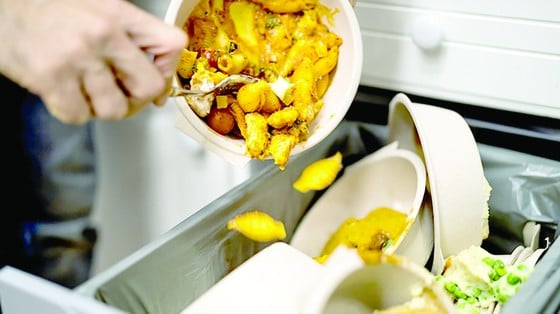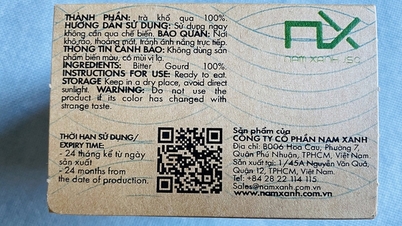SGGP
There is no common standard for food expiry dates, so a lot of good food is discarded due to misunderstandings about expiry dates... All of this causes waste and increases environmental pollution. The United Nations estimates that global food loss and waste accounts for 8%-10% of total greenhouse gas pollution.
 |
| Discarding expired food causes many consequences. |
Smart consumption
“There is a lot of confusion among both consumers and those in the food industry about expiration dates,” said Dana Gunders, executive director of the anti-food waste nonprofit ReFED, according to the Washington Post. This confusion not only misleads shoppers, but also means a lot of good, usable food goes to waste.
Some members of the US Congress are trying to change the law to help reduce emissions from food waste. They have just reintroduced a bill that was introduced in Congress in 2021, called the Food Use-By Date Labeling Act. This would standardize date labels on food, not requiring expiration dates on many foods, but instead providing guidance on safe food storage.
According to the U.S. Department of Agriculture , most expiration dates consumers see on food items are for freshness, not safety. A product that has passed its expiration date may not taste as good as something fresh off the shelf, but it is still perfectly healthy to eat.
Currently, with the exception of infant formula, which requires expiration dates, the United States lacks a national standard for food expiration dates that many other countries have.
The lack of federal law has led to a web of conflicting laws from state to state, with manufacturers, in many cases, putting whatever dates and phrases they want on their products, experts say. We should start weaning off the habit of throwing out expired but still intact items out of an abundance of caution. Food that is nearing its expiration date can also be frozen to last longer, as the freezer acts as a magical pause button, allowing it to retain flavor and last much longer than normal.
In fact, the annual emissions of rotting food in the United States are roughly equal to those of 42 coal-fired power plants. According to the United Nations Intergovernmental Panel on Climate Change, global food loss and waste accounts for 8% to 10% of total greenhouse gas pollution. Emily Broad Leib, a professor at Harvard Law School, sees the manufacturing industry and consumers as key players in reducing carbon emissions through smart consumption.
Not small numbers
Jeffrey Costantino, a spokesperson for ReFED, said there really is no standard for food expiration dates. Confusion among consumers who throw away food past its expiration date can be damaging to the climate and household budgets. About a third of the US food supply, or 80 million tons, is thrown away, according to a recent ReFED estimate. The group also found that wasted food could serve about 149 billion meals, use nearly a quarter of the country’s freshwater resources and 16% of its cropland, and account for 6% of total US greenhouse gas emissions.
On average, Americans waste $1,300 of food each year, estimates Zach Conrad, assistant professor of food systems at the College of William & Mary.
According to the US Food and Drug Administration (FDA), consumer confusion around expiration dates may be responsible for about 20% of food wasted at home, costing an estimated $161 billion each year. And across the European Union (EU), 88 million tons of food are thrown away each year because they are deemed past their expiration date, according to climate action organization Wrap.
In the UK, Waitrose has become one of the first supermarkets to remove the “best before” date in an effort to tackle food waste. Marija Rompani, director of sustainability and ethics at John Lewis Partnership, which owns Waitrose, said: “By removing the best before date from our products, we want our customers to use their own judgement to decide whether a product is still edible, increasing the chances of it being used and not wasted.”
No one likes to throw away food, and people need more support to ensure they can reduce their food waste, according to researchers. Online tools are now available to help people check the safety of their food, such as FoodKeeper, an app developed by the US Department of Agriculture that allows users to check how long food can be stored.
The Zero Waste Kitchen Handbook by Dana Gunders, a pioneer in the field of food waste management in the US, offers detailed practical advice, such as scraping off a few centimeters below blue mold on hard cheese to safely recover the rest. The researchers’ recommendation is to eat the food within 3-5 days and reheat thoroughly to above 75 ° C.
Source



![[Photo] The 1st Congress of Phu Tho Provincial Party Committee, term 2025-2030](https://vphoto.vietnam.vn/thumb/1200x675/vietnam/resource/IMAGE/2025/9/30/1507da06216649bba8a1ce6251816820)
![[Photo] President Luong Cuong receives President of the Cuban National Assembly Esteban Lazo Hernandez](https://vphoto.vietnam.vn/thumb/1200x675/vietnam/resource/IMAGE/2025/9/30/4d38932911c24f6ea1936252bd5427fa)
![[Photo] Panorama of the cable-stayed bridge, the final bottleneck of the Ben Luc-Long Thanh expressway](https://vphoto.vietnam.vn/thumb/1200x675/vietnam/resource/IMAGE/2025/9/30/391fdf21025541d6b2f092e49a17243f)
![[Photo] General Secretary To Lam, Secretary of the Central Military Commission attends the 12th Party Congress of the Army](https://vphoto.vietnam.vn/thumb/1200x675/vietnam/resource/IMAGE/2025/9/30/9b63aaa37ddb472ead84e3870a8ae825)
![[Photo] Solemn opening of the 12th Military Party Congress for the 2025-2030 term](https://vphoto.vietnam.vn/thumb/1200x675/vietnam/resource/IMAGE/2025/9/30/2cd383b3130d41a1a4b5ace0d5eb989d)

































































































Comment (0)